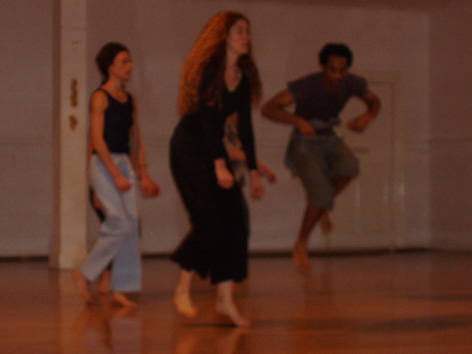Workshop Outcomes
formula AFOTEK
Lab [:] African Dance set to Tekhno Music

Ran Hyman taught a 3 hour masterclass on his AFOTEK
formula followed by a discussion of his understanding of West African
rhythm base and the use of digital techno music and repetitive pulses.
His teaching philosophy also included an introduction to the mental
and physical preparedness, the wholeness of body/mind health and processing
of what he calls mental postures. Ran is a dancer and teacher,
and has created his formual AFOTEK in Vancouver, British Columbia,
after studying with renowned teacher Zab Maboungou (Montreal) who
is a choreographer of contemporary African dance (originally from
Congo, Maboungou teaches a technique based on stuctures of rhythm
and breathing called Rypada). Ran is now completing his PhD in Education
at Simon Fraser University, and is a member of the "Imagination
Education Research Group"(SFU), Faculty of Education, Curriculum
Theory and Implementation. In his practice, as exemplified in the
masterclass taught at Digital Cultures Lab, Ran proposes a focus on
African Techno Culture, Aerosol Art, and AFOTEK(a
new Aesthetic).
In numerous correspondences and exchanges before the Lab, Ran pointed
out that our website and our public announcement consistently "alphabetized"
the name of his teachings wrong, as he uses a spelling for AFOTEK
which is not reproducible in the Western alphabet code of the computer.
The question of the 'alphabet' thus also became a part of our preparations
for the workshop, as Ran pointed out the significance the diacritical
'A' has for him, and sent us the following memo:
The tilde, for example, often gets printed wrong e.g. in newspaper
articles and URLs. In Unixism, if a character is misprinted software
will not respond and/or the directive will produce fragmented data
or zeroed memory. Thus human virtual memory responds in a similar
fashion hence the movement of the body (dance) too will not produce
the desired results.
Correct pronunciation is only the beginning of activiating neurological
responses.
The assumption that a diacritic character is cute and crafty is the
programmers biggest error which could lead to the disease associated
with
vaxocentrism - /vak"soh-sen"trizm/ [analogy with "ethnocentrism"]
A notional disease said to afflict programmers who persist in coding
according to certain assumptions.
My lab will begin with the Alphabet to explore assumptions
surrounding the impact of "alphabetechnological" disease.
Anyone with no Unix background would assume the funny diacritic mark
is tedious, boring and useless.
Where is this going?
Anecdote_1:
Transcendentalism, for example, correct poster and pronunciation is
imperative in order to experience other states of consciousness.
Anecdote_2:
Driving in your car. You turn on the radio. You put in high.
How do you feel about where you are going?
This Alphabetechnological technique prepares student-teachers to investigate
Codes of Dance and Human Desire.
- "aesthetics & ethics are one" beginning with the ZYXs
* * *
For Zab Maboungou's writing on contemporary dance, see her new book:
"Heya...Danse! Historique, Poétique et Didactique de
la danse africaine"
Montréal: Les Editions du Cidihca, 2005.
Zab Maboungou is founder of the Cercle d'Expression d'Expression
Artistique Nyata Nyata in Montréal, as well as artistic director
of Compagnie Danse Nyata Nyata.
From the book:
Les rhythmes naissent aux abords des brèches de nos corps
où s'abreuvent des souffles prisonniers du temps. Ils accouchent
de la danse qui scande le chant éperdu de nos vies et de nos
morts réconciliées.